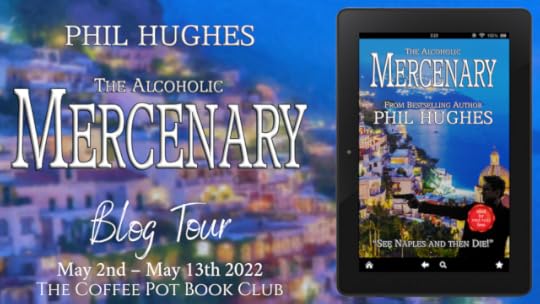Virginia Crow's Blog: Crowvus Book Blog, page 29
June 8, 2022
#HistFicThursdays - Apollo’s Raven (Curse of Clansmen and Kings, Bk 1) - Linnea Tanner - Guest Post
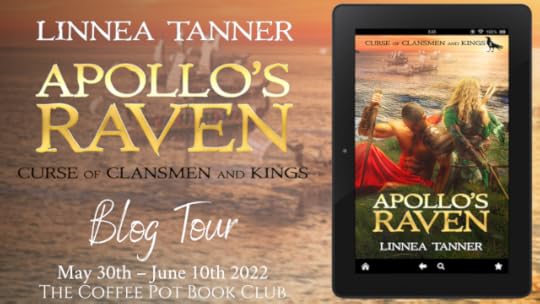
For this week's #HistFicThursdays blog, I am thrilled to be welcoming Linnea Tanner, with the first book in her Curse of Clansmen and Kings series! Apollo's Raven is enjoying its book tour with Coffee Pot Book Club and I am so excited to be able to share this fascinating Guest Post from Linnea about the Highlights and Challenges in Researching Historical Backdrop of Apollo’s Raven. But first, let's meet the book...
Blurb
A Celtic warrior princess is torn between her forbidden love for the enemy and duty to her people. AWARD-WINNING APOLLO’S RAVEN sweeps you into an epic Celtic tale of forbidden love, mythological adventure, and political intrigue in Ancient Rome and Britannia. In 24 AD British kings hand-picked by Rome to rule are fighting each other for power. King Amren’s former queen, a powerful Druid, has cast a curse that Blood Wolf and the Raven will rise and destroy him. The king’s daughter, Catrin, learns to her dismay that she is the Raven and her banished half-brother is Blood Wolf. Trained as a warrior, Catrin must find a way to break the curse, but she is torn between her forbidden love for her father’s enemy, Marcellus, and loyalty to her people. She must summon the magic of the Ancient Druids to alter the dark prophecy that threatens the fates of everyone in her kingdom. Will Catrin overcome and eradicate the ancient curse. Will she be able to embrace her forbidden love for Marcellus? Will she cease the war between Blood Wolf and King Amren and save her kingdom?
Apollo's Raven is available on Amazon (Universal Link) - Barnes and Noble - Waterstones - Kobo - iBooks - GooglePlay - Booktopia - Books-A-Million - Audible - iTunes
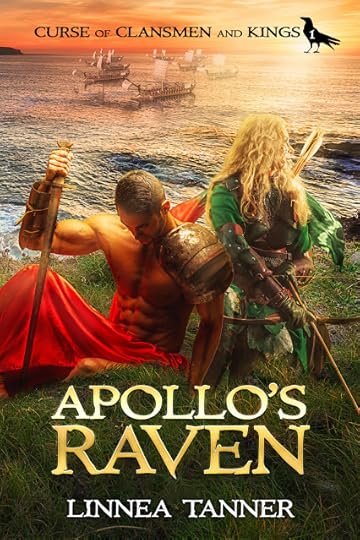
Read the series: Apollo’s Raven (Book 1) - Dagger’s Destiny (Book 2) - Amulet’s Rapture (Book 3)
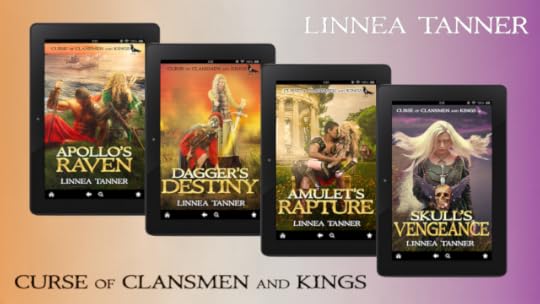
Guest Post - Highlights and Challenges in Researching Historical Backdrop of Apollo’s Raven
Thank you for hosting me and my novel, Apollo’s Raven (Book 1 Curse of Clansmen and Kings ) on the Coffee Pot Book Club blog tour. I did extensive research on the history, mythology, and archaeological findings of ancient Rome and Britannia (Britan) before the Roman invasion in AD 43 by Claudius. The political background used in this series is based on research of southeast Celtic tribes in Britannia that evolved differently than those in Wales, Scotland, and Ireland.
One of the major challenges for researching the Celts is that they passed down their history and mythology through oral traditions. Most of my research had to be gleaned from the biased accounts of Greek and Roman historians, medieval writers who spun Celtic mythology into their Christian beliefs, and archaeological interpretations. Interestingly, Julius Caesar wrote most of the detailed accounts of Celts in Britannia and Gaul as propaganda to support his military campaigns in the Senate.
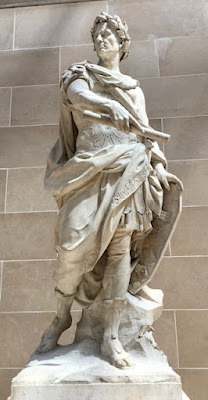 Statue of Julius Caesar
Statue of Julius CaesarSoutheast Britannia (Britain) evolved differently than Wales, Scotland, and Ireland. After Julius Caesar’s military expeditions to the region in 55 – 54 BC, he demanded tribute and hostages in treaties. Thereafter, many of the British rulers’ children were raised and educated in Rome as hostages, adopting the empire’s taste for luxuries. As a result, the internal politics and trading in southeast Britannia were strongly influenced by the Romans.
During this period, several powerful Celtic kings expanded their territories by conquering other tribes as evidenced by their minted coins. To support their extravagant lifestyles, pro-Roman kings warred with other tribal territories to supply the Roman Empire with slaves.
Although there is no written account of any Roman expeditionary forces sent to Britain before Claudius’s invasion in AD 43, there are recorded incidents of pro-Roman rulers pleading for Rome’s help to intervene on their behalf. Recent archaeological findings support that Rome had a military presence that protected areas of Britannia vital to trading before Claudius’ invasion in AD 43.
Archaeological evidence strongly suggest that Claudius’s invasion was nothing more than a peace-keeping mission to halt the expansion of the anti-Roman factions led by Cunobelin’s sons, Caratacus and Togodumnus. Most likely, there was already a Roman military presence protecting areas of Britannia vital for trading with the empire.
Of note, Shakespeare’s play, Cymbeline, is based on the Celtic King Cunobelin to whom the Romans referred as the King of Britannia. One of the plot points in the play is that Roman forces invade to restore tribute that Britannia ceased to pay. The play was likely based on oral traditions or medieval accounts in which there may be some historical accuracy.
I also visited many areas in the United Kingdom and France that are described in my series. I hiked over twelve miles over the white cliffs of Dover in 2012 so I could experience first-hand what my female protagonist, Catrin, experiences in the first chapter of Apollo’s Raven . As she stands near the precipice of the sheer white cliffs, she observes oar-driven warships suddenly appearing out of the haze on the British channel, alarming her of danger. Below is a photograph I took of the Dover Cliffs when a large chunk of the white cliffs collapsed into the sea in 2012.
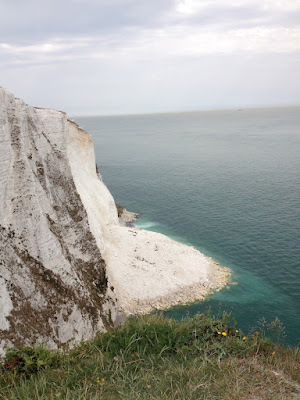 Collapsed Wall Dover Cliffs
Collapsed Wall Dover CliffsA pivotal point for creating the epic tale is when I visited London and was intrigued by the statue of a warrior queen in a chariot with her two daughters set beside the Thames River. I learn she was the famous warrior queen Boudicca who united the tribes in AD 61 and almost expelled the Romans from Britannia. Roman historians described her as a powerful druidess who sacrificed some of her victims to the war goddess Andaste. She inspired my primary character, Catrin who is both a warrior and druidess in the series.
 Boudicca in Chariot
Boudicca in ChariotThe Celtic characters are fictional in Apollo’s Raven except for Cunobelin and his sons, Adminius and Caratacus. Several of the Celtic characters in the novel speak Latin, either through formal training in Rome and Britain or with interactions with Roman merchants. Although the Celtic society was becoming more paternalistic, women were still held in high regard and could rule.
For my series, it was important to capture the essence of the Celtic noble warrior society. The Greek historian Poseidonius writes, “The Celts engage in single combat at dinner. Assembling in arms, they engage in mock battle drill and mutual thrust and parry, sometimes inflicting wounds.”
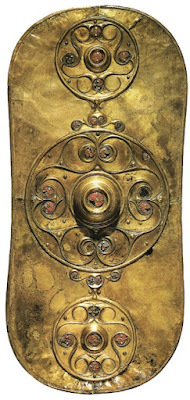 Celtic Battersea Shield
Celtic Battersea ShieldThe Roman characters are fictional except for Lucius Antonius, the son of Iullus Antonius and grandson of Marcus Antonius (Mark Antony). Very little is known about Lucius Antonius except that he was exiled in 2 BC to Gaul after his father was accused of treason and forced to fall on his sword. It is unclear whether Lucius had any children, but it is coincidental that another famous Roman general, Marcus Antonius Primus, was born in Gaul around AD 30. The tragic legacy of the family inspired my primary character, Marcellus Antonius—the great grandson of Mark Antony.
Now, let's meet the author:
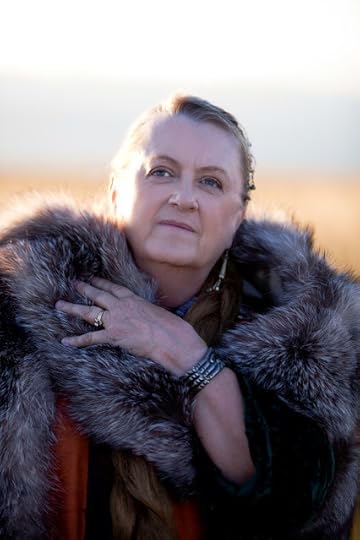 Award-winning author, Linnea Tanner, weaves Celtic tales of love, magical adventure, and political
Award-winning author, Linnea Tanner, weaves Celtic tales of love, magical adventure, and politicalintrigue in Ancient Rome and Britannia. Since childhood, she has passionately read about ancient civilizations and mythology. Of particular interest are the enigmatic Celts, who were reputed as fierce warriors and mystical Druids.
Linnea has extensively researched ancient and medieval history, mythology, and archaeology and has traveled to sites described within each of her books in the Curse of Clansmen and Kings series. Books released in her series include Apollo’s Raven (Book 1), Dagger’s Destiny (Book 2), and Amulet’s Rapture (Book 3). Skull’s Vengeance (Book 4) is anticipated to be released in late 2021 or early 2021.
A Colorado native, Linnea attended the University of Colorado and earned both her bachelor’s and master’s degrees in chemistry. She lives in Fort Collins with her husband and has two children and six grandchildren.
You can keep up with Linnea on these links:Website - Twitter - Facebook - LinkedIn - Instagram - Amazon Author Page - Goodreads - BookBub - Pinterest
Keep up with the rest of Apollo's Raven tour stops by clicking on the banner below:
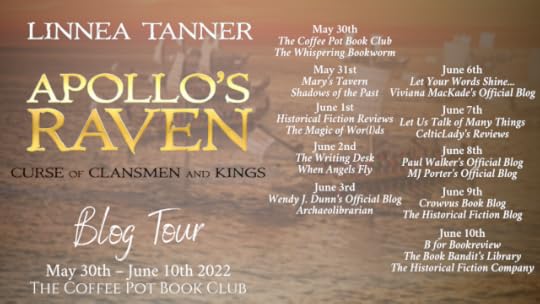
June 1, 2022
#HistFicThursdays - Muskets & Minuets - Lindsey S. Fera - Book Excerpt
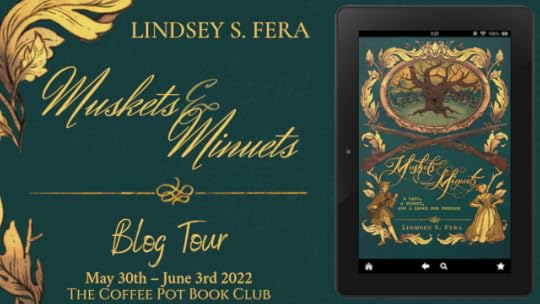
This week, I'm delighted to once again be teaming up with The Coffee Pot Book Club! Today I'm sharing an excerpt from the stunning book, Muskets & Minuets by Lindsey S. Fera!
So let's begin by meeting the book...
Love. Politics. War.
Amidst mounting tensions between the British crown and the American colonists of Boston, Annalisa Howlett struggles with her identity and purpose as a woman. Rather than concern herself with proper womanly duties, like learning to dance a minuet or chasing after the eligible and charming Jack Perkins, Annalisa prefers the company of her brother, George, and her beloved musket, Bixby. She intends to join the rebellion, but as complications in her personal life intensify, and the colonies inch closer to war with England, everything Annalisa thought about her world and womanhood are transformed forever.
Join Annalisa on her journey to discover what it truly means to be a woman in the 18th century, all set against the backdrop of some of the most pivotal moments in American history.
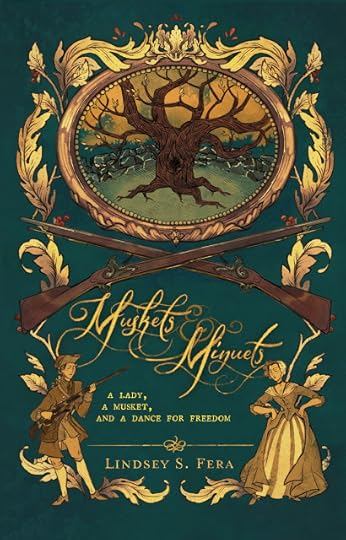
And here's an excerpt to whet your appetite:The dirt road curved upward, and Annalisa followed until she reached the top. Beneath the hazy dawn before her, the Charlestown peninsula stretched across shimmering waters, southeast toward Boston. She squinted at the faintly visible slopes of Dorchester Heights far to the south. Steep, green islands were not the only things to speckle the harbor. Three-masted warships littered the inlet with billowing ivory sails, each one crowned with the blue, red, and white flag of Britain.
She shivered. Far nearer, and more visible through the summer smog, sat a large fortification atop one of Charlestown’s hills. The king’s warships pointed their guns at the rising land—land a thousand minutemen had worked all night to secure.
George and Jack must be there now.
Her throat tightened as she imagined Jack and George clutching muskets behind those ramparts. A thunderclap of artillery shattered the morning calm. At last, she was direct witness to the hostilities. Sweat trickled between her breasts bound in linen, but the fabric wicked all moisture, as did the menses apron between her legs.
I should face no troubles today as I did in Portsmouth.
But the threat of her womanhood in disguise loomed.
A half-mile from Charlestown Neck, Annalisa lingered beneath a wide maple. The cacophony of cannonade washed over her with bitter resonance. Without her militia, she must find a way to safely cross the narrow strip of land.
The clank of metal mixed with a scuffle of marching shoes, and two regiments of what appeared to be provincial militia, gathered across the road. The gentlemen in command, addressed as Colonels Reed and Stark by their subordinates, appeared sullen and stiff. Colonel Stark, a thin, older man who must be in his middle-forties, stood tall and imposing. He wore his cocked hat low over squinted eyes. With a scowl upon his sunken mouth, he held himself in readiness, and lifted his cutlass into the air.
“Gentlemen.” Stark’s craggy voice severed the eerie silence between cannon fire. “Ready yourselves. We march across the neck.”
This was her chance. She gripped her musket. The regiment marched passed at a deliberate pace, and she slipped in.
“Watch yourself.” An older man scrutinized her as she stepped on his foot.
Panicked, she lowered her hat, and fell in with the march. She must take extra care to blend in and keep her identity hidden, no matter the cost.
When they reached Charlestown Neck, water glimmered on either side of the narrow strip. Gunboats and warships blasted artillery across, turning the ground to crumbled wasteland. A blazing cannon screamed forth and lodged itself into the earth mere feet from her. The ground quaked and Annalisa lost her footing. She tumbled and fell, the moist soil inches from her nose. A minuteman from behind scooped her up and continued the march, scarcely wasting a step. Shaken, she advanced across the neck.
Bunker Hill rose before them. It was probably thirty feet high. Beyond it, a valley, then a smaller rise, Breed’s Hill, she’d heard them call it. There, atop the shorter mount, minutemen gathered behind six-foot high dirt walls and ram-shackled rail fences.
Perspiration gathered on her brows and dripped down her back. Hand trembling, Annalisa wiped her forehead. The regiment stopped after they descended Bunker Hill. To her left, the grassy land sloped down toward the banks of the Mystick River. Colonel Stark crossed in front of the regiment with another officer.
“My boys.” He gestured to the river. “Low tide opened up this beach. You are to secure it with stones to form a breastwork to the water’s edge. Three ranks of men will flank you from behind.”
Before she could sneak away, Annalisa fell in with a group descending the bank. They scurried over the edge and set to building a stone wall that would meet the brackish river waters.
A young, bright-eyed boy handed her a large stone. “This is madness, is it not?”
She grabbed the heavy rock from him, and her knees buckled. Annalisa bit her tongue, unwilling to speak. The timbre of her voice over cannonade would surely give away her secret—the one secret she had left.
“Stack the stone, lad,” an older man barked.
She placed the large rock atop the first row.
“I daresay, we’re lucky to have made it this far.” The young man handed her another small boulder.
“Nathaniel.” She gasped.
He tipped his hat out of habit, then his brows lifted. “Ben Cavendish.”
They embraced for only a moment and Annalisa pulled away, her anxiety pulsating. Will he ask why I abandoned our militia at Concord?
Hesitantly, she asked, “What are you doing here? Is Captain Foster here with the militia?”
“No, I left the militia shortly before Concord. My family moved to Exeter in New Hampshire. I enlisted with Colonel Stark’s first New Hampshire regiment only a fortnight ago.”
Annalisa exhaled, relieved. He didn’t know she’d been detained in Topsfield that fateful day Ebenezer fell at Concord.
“Here we are, Cav. Everything we believe in we get to fight for.” Nathaniel clapped her back, and his palpable vigor set her at ease—an old friend from her militia beside her in this fight.
You can buy Muskets & Minuets from Amazon UK - Amazon US - Amazon CA - Amazon AU

Now, let's meet the author:
A born and bred New Englander, Lindsey hails from the North Shore of Boston. A member of the Topsfield Historical Society and the Historical Novel Society, she forged her love for writing with her intrigue for colonial America by writing her debut novel, Muskets and Minuets. When she's not attending historical reenactments or spouting off facts about Boston, she's nursing patients back to health in the ICU.
You can find Lindsey on this links:Website - Twitter - Facebook - Instagram - Amazon - Goodreads
To follow the rest of the Muskets & Minuets tour, click on the banner below:
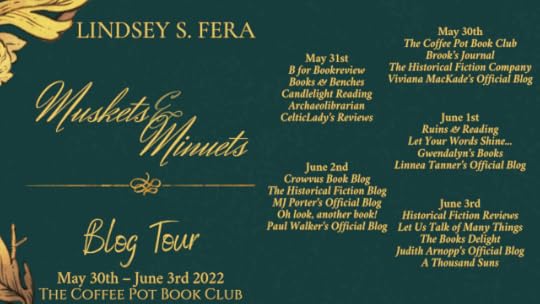
May 26, 2022
#HistFicThursdays - Horrible Histories 5 - Owain Glyndŵr
I absolutely love this song! I don't know whether it is that I know more Tom Jones and Welsh songs which the Owain Glyndŵr song calls on, or whether it is just more my sort of music, or that - which I think is another consideration - this is about a historical figure who drifts into the realms of legend.
At the moment, I am rereading my family saga and I came across this line:
That man will be a legend until the day he dies, and an inspiration beyond.
When I decided to write today's blog on Owain Glyndŵr, this quote fitted rather well. The man being discussed in the book was not a real figure from history but - after sharing more than 400,000 words with him during the course of my family saga - it certainly feels like I know him better than any of his real-life contemporaries!
When I was researching Owain Glyndŵr for this blog, I was surprised to find just how long his reign lasted. I had assumed it was almost a flash-in-the-pan uprising, similar to those we had in Scotland several years later, but Glyndŵr managed to hold the English at bay for several years. From the beginning of his campaign to his supposed death, he managed 15 years without succumbing to his enemy and - also in great contrast to many of the Scottish heroes - he was never betrayed.
But the thing which grabs me the most is Glyndŵr's ending. Most notably that it does not end. As a historical fiction writer, lives which are filled with heroics are like gold. But those which feature mystery are priceless. Drifting into the realms of legend and myths, Glyndŵr was clearly a man who inspired others, and remains one of those semi-ethereal individuals whose return people await, like the highly disputed and romanticised King Arthur. I had something a little bit similar when I began writing The Year We Lived: I knew exactly how the story would end (but there's a massive spoiler right on the very last line, so I'm not sharing it here!). The interweaving of myths and legends as well as dollops of superstition - which were commonplace at that time - was so intricate in the formation of that web: the white hart; the birdlore; the changeling. But people believed it so entirely. I can't help but wonder whether our heroes today, in their fleeting faddy nature, can compare to those of the past.
Heroes are an integral part of history, and are certainly a crucial part of the way I write historical fiction. But heroes are not necessarily warriors, or men of arms. In fact, they are not necessarily men at all! For the first time in almost five years(!), I have just reread Day's Dying Glory and there is a line in there which goes like this...
Imogen looked up at her mother once more and ignored the rest of the conversation. What would she have made of such a fuss over a hero? Undoubtedly she would have declared that the man was a hero because there was no one else to fill the position of a leader, and she and Major Tenterchilt would debate the importance of heroes to the common people.
Owain Glyndŵr is a hero in every sense of the word - filling a position which was needed at the time, and a leader to those around him. He sought to establish a rule which put his people not ahead of the English, but on an equal footing with them, able to decide their own laws and govern themselves. But a hero needs to be more than their actions: they have to be an inspiration. What greater test of inspiration can you get than someone who - hundreds of years on - people are still superstitiously believing will come to their aid?
And his inspiration is not linked to times and places. We see Glyndŵr appearing as a heroic character in Shakespeare's work as well as - and this is one of my favourites! - William Blake's incredible Visionary Heads. Over the years, Britain absorbed Owain Glyndŵr as their own hero, even going so far as to name military ships after him. The cynic in me believes this was a hope to extinguish a uniquely Welsh aspect to the man, but Glyndŵr's name remains synonymous with Welsh culture and nationalism.
There are few other characters from history who measure up to the heights which Glyndŵr reached. He remains an enigmatic figure and a dream come true to the realms of historical fiction. But then why leave it there?
Y Mab Darogan is The Foretold Son. Perhaps his return is on the horizon...
May 24, 2022
Book Review: Siggy the Soccer Dog by Brian Frederick (Illustrations by Vivien Sarkany)


Siggy the Soccer Dog tells the story of a very ordinary sausage dog, who does extraordinary things in his dreams. This charming, very traditional, picturebook story takes the reader on a dreamy adventure in which Siggy is the hero of the hour in a football match.
This is a very gentle tale which would make a wonderful bedtime story for any child who loves either football or dogs. There was only one part I wasn't 100% convinced by, and that was the football chant/song which was included, but then I've never been to a live football match and anyone who has been might tell you that it captured the atmosphere perfectly.
The composition of the book is stunning: it is like a work of art. The words dance across the page, accompanied by perfect illustration. I would have loved to be able to take a hard copy of the book into school for my class to enjoy.
In summary, an utterly charming story and a book which reflects the magic of dreams.
Blurb
Siggy looks so cute as he twitches and turns in his sleep.
But as they watch him, little do the family know that in his dream he is “Siggy Sosidj” the star player for Manchester United. It’s up to Siggy to rescue his team in the biggest game of his life. But can he do it?
Join Siggy and a multi-national cast of doggie players to find out - in a fast-paced, beautifully illustrated tale about overcoming the odds, staying true to your purpose and being kind...
Social Connections
Twitter/Blog:@BrianFredAuthor@lovebooksgroup @lovebookstours
May 18, 2022
#HistFicThursdays - Bird in a Snare - N.L. Holmes - Q&A Guest Post

It's #HistFicThursdays again, and this week I'm thrilled to be sharing a Q&A post from award winning author, N.L. Holmes, as part of her Coffee Pot Book Club tour. Find out what research drew her into the world of Ancient Egypt, and the enduring appeal this time has for her...
Blurb
When Hani, an Egyptian diplomat under Akhenaten, is sent to investigate the murder of a useful bandit leader in Syria, he encounters corruption, tangled relationships, and yet more murder. His investigation is complicated by the new king’s religious reforms, which have struck Hani’s own family to the core. Hani’s mission is to amass enough evidence for his superiors to prosecute the wrongdoers despite the king’s protection—but not just every superior can be trusted. And maybe not even the king!
Winner of the 2020 Geoffrey Chaucer Award for historical fiction before 1750.
Bird in a Snare is available from Amazon UK - Amazon US - Amazon CA - Amazon AU - Barnes and Noble - Kobo - iBooks - Audio
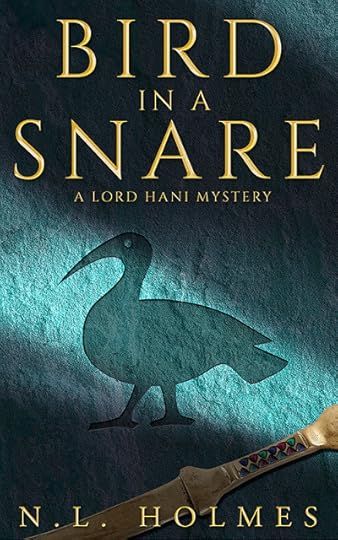
The Crocodile Makes No Sound (Book 2)
The North Wind Descends (Book 4)
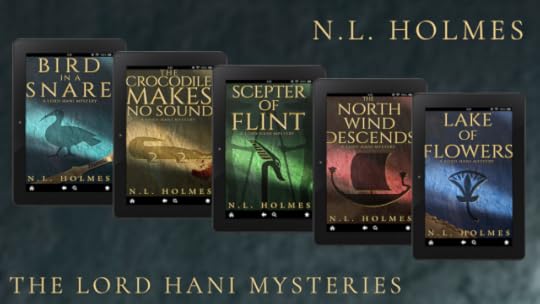
Did you have a favourite resource for your research?If so: what was it, and why?I used so many research materials, I couldn’t point to one favorite. Perhaps you could say that Ancient Egyptian Literature, vol. II, translated by Miriam Lichtheim, was one of my most useful sources, because the titles of all the books are quotes from some piece of ancient literature—the Book of the Dead, a hymn, an aphorism. In the case of Bird in a Snare, the title comes from the Amarna Letters, an archive of diplomatic correspondences. The fictional Hani is a writer of aphorisms, and they’re all real—written by a guy named Ani, so I’ve conflated the two men. I had the advantage of a fair amount of general professional knowledge about this time and place because I had taught a course on Ancient Egypt for years, but there was a lot of refining of specifics, for example, details about a particular profession, that I needed to do. I think the real reason I moved from teaching to writing historical fiction is so I could continue to do research when I retired!
What is it about this time period which inspired you to set you book then?I knew from my teaching experience that ancient Egypt has a lot of fans, and the period during and after the reign of Akhenaten is a particularly fascinating one. Many people know at least the names of the “heretic pharaoh” and his beautiful wife Nefertiti. The religious, economic and social changes introduced by this king are almost unimaginably disruptive, and I wanted to capture some of that impact on people’s everyday lives as well as on foreign policy. But it’s an interesting moment also for what we don’t know about it. Akhenaten was expunged from the historical record by his successors, so we didn’t even know he existed before the end of the nineteenth century, and we’re only just now starting to reconstruct events of his reign. We don’t even know who the kings are who follow him. Scholars are all over the place in their theories, and the author can thus pick her version of history and embroider at will, as long as she doesn’t transgress any of the facts we actually know for sure.
As historical fiction writers, we tend to imagine ourselves in the time we’re writing.If you could go back to this time period, what do you imagine yourself doing?Realistically speaking, I’d probably be a “lady of the house” like most women. But since I’m a working-class kind of gal, I’d like to be some sort of creative artisan like Maya’s mother, a goldsmith. I actually did silver-smithing when I was a teenager! Or maybe a seshet, a female scribe, unusual though that would be. Hani’s daughter Neferet learns to read and write, but she becomes a doctor, and I’m not sure that’s up my alley. The fact is, Egypt was one of the better places to be a woman in antiquity. They had more or less equal rights and could divorce if they found themselves in a bad marriage. Maybe I’d become the head “man” of my village—that really happened sometimes.
Now, let's meet the author:
 N.L. Holmes is the pen name of a professional archaeologist who received her doctorate from Bryn Mawr College. She has excavated in Greece and in Israel and taught ancient history and humanities at the university level for many years. She has always had a passion for books, and in childhood, she and her cousin (also a writer today) used to write stories for fun.
N.L. Holmes is the pen name of a professional archaeologist who received her doctorate from Bryn Mawr College. She has excavated in Greece and in Israel and taught ancient history and humanities at the university level for many years. She has always had a passion for books, and in childhood, she and her cousin (also a writer today) used to write stories for fun.You can follow N.L. Holmes on these links:Website - Twitter - Facebook - LinkedIn - Instagram - Pinterest - BookBub - Amazon Author Page - Goodreads
Keep up with the rest of the Bird in a Snare tour stops by clicking on the banner below:
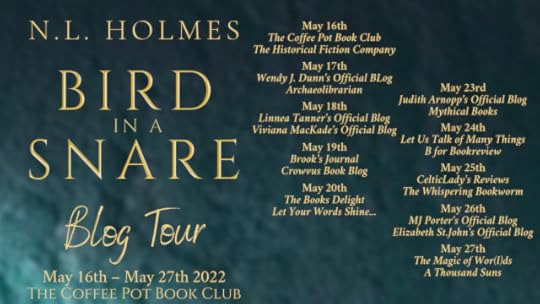
May 11, 2022
#HistFicThursdays - The Admiral’s Wife - M.K. Tod - Excerpt
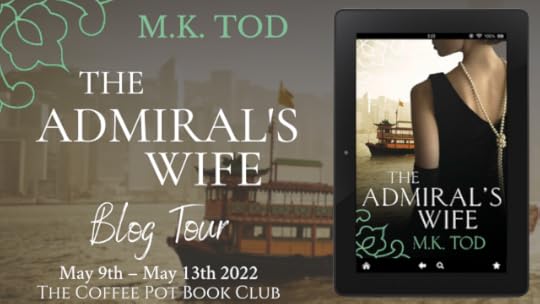
Today, my #HistFicThursdays blog welcomes M.K. Tod and her intriguing dual-timeline book, The Admiral's Wife, as part of her Coffee Pot Book Club tour.
Let's meet the book...
The lives of two women living in Hong Kong more than a century apart are unexpectedly linked by forbidden love and financial scandal.
In 2016, Patricia Findlay leaves a high-powered career to move to Hong Kong, where she hopes to rekindle the bonds of family and embrace the city of her ancestors. Instead, she is overwhelmed by feelings of displacement and depression. To make matters worse, her father, CEO of the family bank, insists that Patricia’s duty is to produce an heir, even though she has suffered three miscarriages.
In 1912, when Isabel Taylor moves to Hong Kong with her husband, Henry, and their young daughter, she struggles to find her place in such a different world and to meet the demands of being the admiral’s wife. At a reception hosted by the governor of Hong Kong, she meets Li Tao-Kai, an influential member of the Chinese community and a man she met a decade earlier when he was a student at Cambridge.
As the story unfolds, each woman must consider where her loyalties lie and what she is prepared to risk for love.
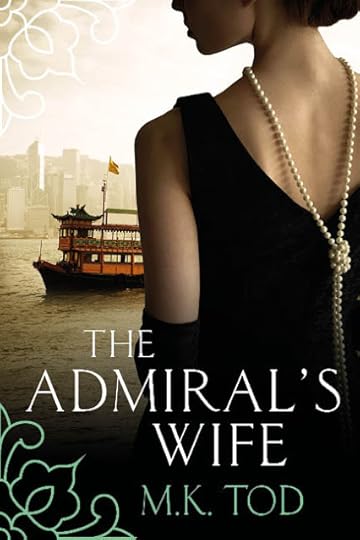
Praise for The Admiral's Wife:
“Family secrets and personal ambitions, east and west, collide in this compelling, deeply moving novel." - Weina Dai Randel, award-winning author of THE LAST ROSE OF SHANGHAI
“Irresistible and absorbing.” - Janie Chang, bestselling author of THE LIBRARY OF LEGENDS
You can buy The Admiral's Wife via the universal link HERE
Here's a excerpt to whet your appetite:
April 1912 – Isabel Taylor clutched her straw hat in one hand and her daughter Georgiana’s hand in the other, as the China Seas cleared the tip of an outlying island and Hong Kong Harbor came into view.
“Look at all the little boats, Mummy,” Georgiana said. She pointed at a jumble of vessels the size of large rowboats anchored in long columns perpendicular to the quay.
“I see them, sweetheart,” Isabel said. “Do you remember that they’re called sampans? People use them for fishing. But I had no idea there would be so many.”
At least fifty passengers stood at the bow rail watching the city come into view. Isabel smiled at the line of hats her female shipmates wore: boater hats, wide-brimmed hats, turban-style hats, hats with feathers, hats with elaborate silk flowers. In addition, a number of women held colorful parasols edged with frills to shade their faces from the hot sun. Some of the women were animated; others looked anxious, even wary.
“It’s mountainous,” a woman dressed in blue said to no one in particular. “I didn’t expect mountains.”
Isabel hadn’t expected mountains either yet there they were, craggy peaks that embraced the city of Victoria, where she and her husband and daughter had come to live. Isabel was struck by the sudden reality that this foreign place would be her home—a place of strange customs and exotic scenery, of unusual food and dramatically different climate, and of people who looked nothing like her.
When Henry had explained his new position as Commander-in-Chief of the China Fleet, Isabel had experienced a wave of excitement. The Far East had fascinated her since she was a young girl learning about the British Empire: India, Burma, Ceylon, Malaya, Borneo, Singapore, Hong Kong. She poured over pictures her father showed her and read stories of daring exploits and dangerous journeys in these far-away worlds.
In an unprecedented move, her father, a former member of parliament representing Cambridge University, had invited several foreign students to dinner. During the lengthy meal, Isabel had spoken to a student from Burma who’d been seated on her left and a student from Hong Kong on her right. Both were polite, well-spoken, and engaging, and she wondered now whether she might meet the man from Hong Kong once more.
Georgiana tugged at Isabel’s skirt. “Will we get off soon, Mummy?”
Isabel smoothed Georgiana’s blond curls. “Yes, Georgie. Very soon.” She often called her daughter Georgie. Georgiana seemed too grand a name for a little four-year-old girl.
“But where’s Papa? Isn’t he coming with us?”
“Of course, he is. I’m sure your father is talking with Captain Davidson,” she replied.
Isabel crouched down, taking care not to wrinkle the white muslin jacket and long white skirt she’d put on that morning in anticipation of finally reaching their destination. White was impractical but it suited her fair skin and auburn hair, and she was keen to make a good impression. “The captain will have wanted Papa’s advice about coming into port.”
When they’d gone out on deck an hour earlier, Isabel had been unable to find Henry. Not an unusual occurrence. The ship’s bridge was the most likely place Henry would be right now. Duty and family were often at odds for her husband. For the most part, duty took precedence.
“I’m glad we’re here, Mummy. Will my toys be here too?”
After reassuring her daughter, Isabel continued to watch as they navigated through a harbor crowded with ships of every size and purpose: warships, barges, tugboats, ocean steamers, large sailing vessels, hundreds of seagoing junks, and what seemed like a small city of sampans bobbing up and down along every section of the shore. A minute later, a green ferry with white trim passed so close to the China Seas that she could see the faces of its passengers standing beneath a dirty canvas canopy.
Isabel shielded her eyes from the glare. Four- and five-story buildings lined the waterfront, while piers jutted from the quay like long limbs. Rising up the slopes, tier over tier, were hundreds of closely built houses interspersed with dense foliage. Dotting the hillside beyond the city were apartment buildings and what looked like spacious homes. Smoke belched from factories in the distance. As the ship drew closer, she noticed brightly colored awnings and a church spire that reminded her of St. Mary’s in Islington.
“Here you are, Mrs. Taylor,” Muriel Fletcher said. “I’ve finished the packing. Can I help with Georgiana in any way?”
“Georgie’s fine with me,” Isabel said to the governess. “But stay with us and watch the ship dock, Muriel. What do you think of your first glimpse of Hong Kong?”
“It’s astonishing, Mrs. Taylor. I’m so fortunate you asked me to come along.”
The ship made a wide turn as it prepared to dock, exposing a low-lying area filled with ramshackle buildings that looked like they’d blow away in a strong wind. This was Kowloon, located on the mainland to the north of Hong Kong Island. The turn complete, Isabel noticed the Union Jack flying proudly atop what might be a government building and a line of palm trees waving in the breeze. The quay teemed with people and waiting vehicles—everything from carriages and lorries to rickshaws and motorcars.
Slowly the China Seas drew alongside a concrete pier, where men shouted in a language unlike any other Isabel had ever heard while fastening thick ropes tossed by the ship’s crew. After four long weeks, they had finally arrived.
“There you are,” Henry said, his voice tinged with impatience. “I’ve been looking everywhere for you, Isabel. Why are you and Georgiana standing here?”
Georgiana’s enthusiastic chatter forestalled the tart reply that sprang to Isabel’s mind. She had imagined the voyage as an opportunity to relax with her husband and young daughter away from the demanding naval duties that had dominated life in London. Instead, Henry had spent hours every day with Captain Davidson, discussing seafaring conditions in the waters around Hong Kong and the challenges of the territory her husband would command.
To make matters worse, because of Henry’s new position as commander-in-chief of the China Fleet, they were assigned to the captain’s table at dinner, which often entailed long discussions of naval matters and piracy, and debates over the significance of Germany’s military buildup. Weeks at sea had done nothing to improve the mood between them—quite the contrary, in fact.
Isabel watched Henry hoist Georgiana onto his hip and point to various places on shore. At least he’s a good father and he loves Georgiana, she conceded to herself.
“We’ll wait for the others to disembark,” Henry said. “The commodore sent word there’s to be a welcome ceremony. Afterwards, they’ve arranged for someone to take you, Georgiana, and Miss Fletcher to temporary quarters while I do an inspection and meet the senior officers.” He checked his watch. “I may not be able to join you for dinner.”
When Isabel was tired, she spoke her mind. “Our first dinner in Hong Kong, and you’re expected to be elsewhere?”
Henry sniffed, then twitched his nose. “Please don’t fuss, Isabel. You know I dislike it when you fuss. As I’m taking up new duties, there are certain expectations. I can’t let people think I’m ruled by my wife’s preferences, now can I?”
Perhaps he meant the statement as a little joke, but she wasn’t in the mood for humor. “There’s no danger of them thinking that, Henry. No danger at all. But we’ll manage without you. Join us as soon as you can.” Isabel took Georgiana’s hand. “Come with Mummy, poppet. I’m sure Miss Fletcher has all your things ready. We’re going on an adventure.”
I won’t be able to count on Henry, Isabel thought, as she supervised the loading of their trunks and other cases into a delivery van. I’ll have to make my way here on my own.
The prospect was daunting. She should have known her husband would throw himself into his new responsibilities without worrying about her or their daughter. He would assume that Isabel could manage and be puzzled if she found their new circumstances difficult. If she complained, he would say, “You’ve just got to get on with it.”
Isabel resolved to do just that.
Now, let's meet the author, M.K. Tod...
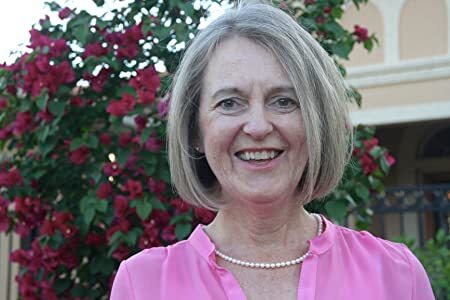
M.K. (Mary) Tod’s interest in historical fiction began as a teenager immersed in the stories of Rosemary Sutcliff, Jean Plaidy, and Georgette Heyer. In 2004, her husband’s career took them to Hong Kong where, with no job and few prospects, Mary began what became Unravelled, her first novel. The Admiral’s Wife is her fifth novel.
Mary’s award-winning blog, www.awriterofhistory.com, focuses on reading and writing historical fiction. She’s an active member of the historical fiction community and has conducted five unique reader surveys on topics from readers’ habits and preferences to favorite historical fiction authors. Mary is happily married to her high-school sweetheart. They have two adult children and two delightful grandsons.
You can find Mary on these social media links:Website - Blog - Twitter - Facebook - LinkedIn - Instagram- BookBub - Amazon Author Page - Goodreads
Keep up with the rest of Mary's tour by clicking on the banner below:
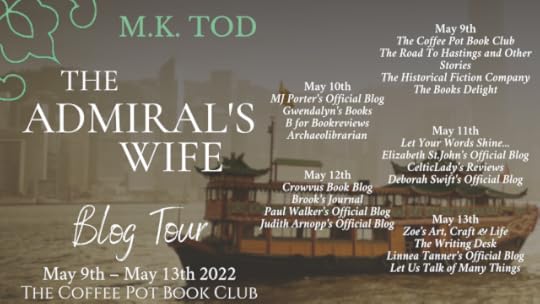
May 4, 2022
#HistFicThursdays - The Alcoholic Mercenary - Phil Hughes - Guest Post
Blurb
They said, “See Naples and then die!”
Rachel had thought it was to do with the natural beauty of the place. A misconception she soon lost after climbing down from the C130 troop carrier. The suspicious death of her predecessor, followed by the murder of a sailor, and an enforced liaison with a chauvinistic and probably corrupt cop saw to that.
“See Naples and then die!”
Some said the saying was anonymous. Some attributed it to Goethe. Still, others said it was Lord Byron, or maybe Keats. When the young brother of a mercenary hitman became her main suspect, Rachel leant towards Keats. Didn’t the poet die here? Somewhere near, for sure. Probably coined the phrase on his deathbed.And then, the cherry on the top of her ice cream soda, she could smell grappa on the breath of the mercenary when she interviewed him. The only thing worse than a violent man: a violent man who drinks.
The only thing worse than a violent man who drinks: a violent man who drinks and considers himself Rachel’s enemy.
The Alcoholic Mercenary is available on Kindle Unlimited
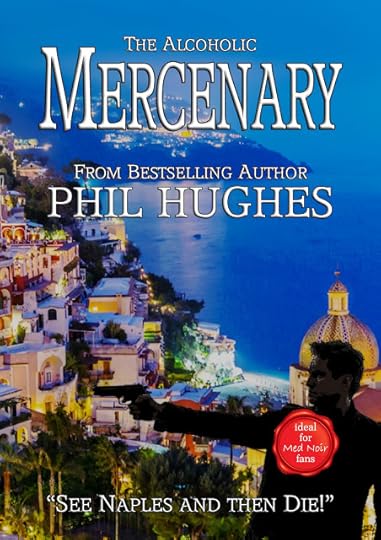
Guest Post
The local proverb, “Vedi Napoli e poi muori” (See Naples and then die), appears on the cover of The Alcoholic Mercenary.
I use it as a running theme throughout the story. Both the protagonist and the antagonist touch on it. Rachel hears it at her leaving do, a joke in poor taste from one of her colleagues. She then questions if she has died when feeling the heat of Naples for the first time. Boccone thinks about it when things start down a steep and greasy slope.
The first time I heard it was in 1975 when my father yelled it jubilantly as we rounded a bend while travelling on the city ring road. Naples was laid out before us like an architect’s model.
But where does the saying come from, and what does it mean?
“Vedi Napoli e poi muori” is a local proverb about the city’s beauty and its surroundings. The popular belief is that Goethe translated it. However, l have heard it attributed to Wordsworth and even Keats, though Keats died in Rome without seeing Naples. Shortly after I first arrived in Lucrino in the early nineties, a local doctor told me he thought Keats was the first to translate the phrase. He is not the only one convinced that the poet visited Naples before he died. The saying is often considered to mean “see Naples before you die” rather than “you will never see better, so after seeing it, you might as well die.”
For me, personally, it goes much deeper. It is not only the city’s beauty and surroundings that are being extolled but also its rich history and the passion of its inhabitants.
Most would think of Naples as the sum of its parts: the start of the Amalfi Coast, the islands of Capri and Ischia, the ruins of Pompeii, to name a few. I believe there is much more to it.
Pozzuoli, where the bulk of The Alcoholic Mercenary occurs, is a town of beauty, but also frequently surprising gems of history. Originally founded as the Greek colony of Dicaearchia (City of Justice) by Greek emigrants, Pozzuoli was taken by the Romans during the Samnite Wars and became the city of Puetoli in c. 194 BCE. Much like Rome, the town is full of ancient architecture: Roman markets; a necropolis; an amphitheatre, which used to host sea battles because it was below sea level, but now sits above the town on a hill because of the bradisismic nature of the area (that is, the tectonic plates move up and down rather than from side to side, to the extent there is a sunken village called Tripergola out in the bay opposite the modern village of Lucrino, a real Atlantis). To say Pozzuoli is a hotbed would be an understatement because it sits atop Campi Flegrei (the Fields of Fire), a volcanic belt that runs around the gulf. Solfatara is an active volcanic vent at the top of a hill above the town. When the wind is in the wrong direction, Solfatara suffuses the area with a rotten egg pong. Although on first whiff, it is almost unbearable, over time it recedes so much, the locals barely notice it.
Oh, and what history the area has. Caligula had a bridge built from Pozzuoli to Baia because an oracle predicted he would ride a horse across the Gulf of Pozzuoli before he became emperor. A little like Hell will freeze over before Donald Trump is re-elected President.
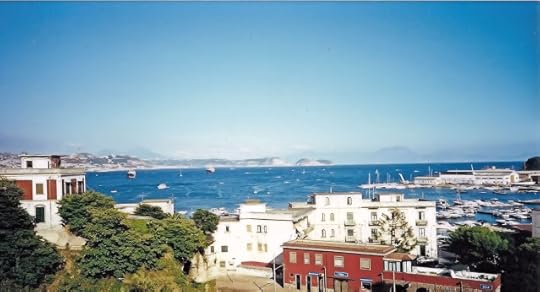 (Terme-Baia: this is a photo I took from the balcony of a friend’s apartment)
(Terme-Baia: this is a photo I took from the balcony of a friend’s apartment)In the photo, if you look over the station of Baia (where PO Jones was shot), on the left, under the just visible shadow of Vesuvius, is the port of Pozzuoli. Imagine a bridge extending that distance and Caligula riding a white charger across it.
Sulla had a holiday villa in Cumae, which sits on top of the bay facing Pozzuoli. The village of Lucrino is hemmed in by two lakes and a volcano. The largest of the lakes, Lago d’Averno (Avernus), was considered the entrance to Hell by the Romans, and many of the locals still believe it to be so. When describing it, they proclaim — in a hushed voice — that it is the deepest lake in Europe, if not the world, which is, of course, untrue — but no less awe-inspiring for all of that.
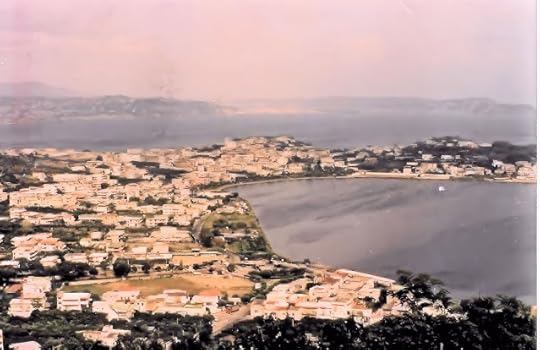 (Miseno: This is a photo I took from the top of Monte di Procida)
(Miseno: This is a photo I took from the top of Monte di Procida)The largest fleet in the world (Roman) was stationed in the port of Miseno (in the photo), where the Coast Guard interceptor that caught Beni Di Cuma was stationed — opposite the port of Pozzuoli. The Sybil’s caves (beside Lago d’Averno) are thought by some historians to be the actual location of the Greek Oracle thought by most to be at Delphi.
Having lived there from the nineties to the naughties, my wife and I felt a great affinity with the sense of atmosphere engendered by its lively past and its passionate people. We would be there still if a medical emergency had not forced us to return to Ireland.
Now, let's meet the author:

Although educated in Classical Studies, Phil is the author of several historical crime novels. Having spent many years living in the Mafia infested hinterlands of Naples, Phil bases his novels on his experiences while living there. Much of what he includes in his stories is based on real events witnessed first-hand. Having retired from writing and editing technical documentation for a living, Phil now lives in Wexford with his partner and their border terriers, Ruby, Maisy, and the new addition Ted. He writes full time and where better to do it than in the Sunny South East of Ireland.
You can keep up with Phil on these links:Website - Twitter - Facebook - LinkedIn - Instagram - Amazon Author Page - Goodreads
Keep up with the rest of The Alcoholic Mercenary tour stops by clicking on the banner below:
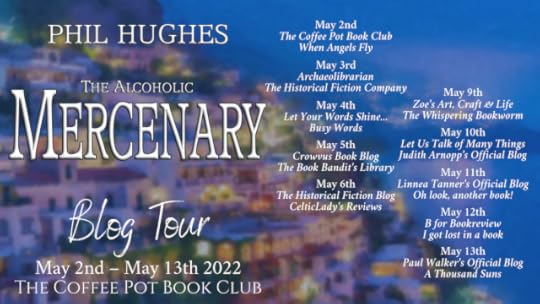
April 28, 2022
#HistFicThursdays - Horrible Histories 4 - William Shakespeare
The pen is mightier than the sword, so it’s said. One man who proves this statement to be true was William Shakespeare. He remains to this day one of the most quoted writers in the world and his insults have become legendary. There are scores of books of them, and countless internet generators for them.
But his insults, some of which work better than others in the modern world, are not the only things he used as weapons. As the song says, there are countless things we say because he strung them together and tucked them into our cultural knowledge. Phrases like “wild goose chase” and “love is blind” are so ingrained in our minds we use them without stopping to think where they came from and only a little bit more about who came up with them.
Along with this power, comes the supreme act of propaganda. Here, we see the truth in that statement, for we see the pen is truly mightier than the sword. Shakespeare rewrote – or, is some cases, just wrote – history. There are lines from his plays which has shaped how people view historical figures. Lines like “my kingdom for a horse” or “once more unto the breach, dear friends” have helped to adapt how people view Richard III and Henry V for the last 500 years. But the important thing to remember is that he was a crowd-pleaser. The more he pleased the crowd, the better his chances of money and fame. His Histories, therefore, should only be viewed as a source of entertainment, not historical accuracies.
And then there comes another consideration. Shakespeare supposedly gave the English language approximately 3,000 words. But did he really create all those lines he is credited with? Is it not just as likely he used the expressions of others to create an immersive and connectable play? After all, in today’s film industry, we can see screenwriters adapting books to make them more accessible to their audience. Is it not likely he did the same?
Whether or not this is the case, though, is almost immaterial. The fact remains that he either created these phrases and words, or preserved them for future generations. He is simultaneously hated and revered by the British population who almost all have to study his works in some way, shape, or form at some time. For my own part, I confess to being in awe of his adaptability and shrewd management of his audiences. Maybe one day I’ll work out how to sell my own work so succinctly.
But, for now, just try to remember: “one can desire too much of a good thing”!
April 21, 2022
Book Review: Honey Harvest by Elissa Kerr (Illustrations by Zoe Saunders)
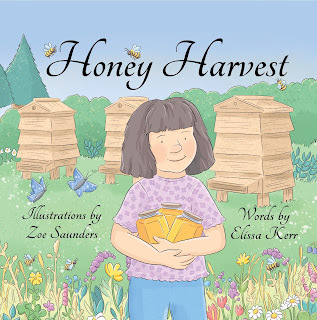

Honey Harvest tells us the story of a little girl who loves honey and goes on a beautifully ordinary adventure to find out how bees make honeycomb and how that is then turned into the runny honey which she loves to eat.
It’s a long-running joke in my family that I made my little sister scared of bees. As a child, I was absolutely terrified of them and used to run away every time one came near me. Of course, as Clem got old enough to play outside, I taught her to do the same thing. Oops.
I do love bees though. We don’t keep them ourselves, but we have many wonderful wild species which visit the garden, including some rare and unusual ones. Bees are little furry, buzzy proof that magic exists.
Naturally, I really love honey too. Honey on Shredded Wheat… mmm… and, recently, I’ve been reading lots about Alexander the Great so I discovered other fascinating properties of honey (if you don’t know, consider looking it up – very interesting, if slightly grisly).
Back to Honey Harvest…
…this is a book I would have loved to read as a child who was afraid of bees. The story is written in rhyme, which will appeal to the little ones. Once or twice, I wasn’t 100% convinced by the rhymes but it didn’t spoil my enjoyment of the story at all. It is a book which teaches without letting on – and children will find it fascinating. One of my regrets is that, as a worldwide reviewer, my copy was an ebook so I couldn’t take it into school for my class – I think they would really have enjoyed it, and beekeeping is a branch of farming which doesn’t get covered in enough farming kidlit.
As well as the lovely story, the illustrations are stunning and absolutely perfect to compliment the words. As a child of the 1990s, they reminded me stylistically of the Usborne Farmyard Tales and that just stole my heart straight away. The “factory bees” page is absolutely adorable!
In summary, a beautiful book which will encourage little ones to explore the natural and engineering magic which goes into making delicious runny honey!
Blurb
It's late summertime in the meadow. Flowers are in full bloom and honeybees float on the warm breeze. It's now time to harvest honey from the hive.
Beautifully illustrated, this buzz-worthy book is the perfect introduction to the tools and traditions involved in beekeeping.
Social Connections
Twitter/Blog:@lovebookstours @igbooktours
Facebook Handle: Scenic Route Publishing
Author's Website: https://www.scenicroutepublishing.com/
April 20, 2022
#HistFicThursdays - Sea of Shadows - Amy Maroney - Book Excerpt
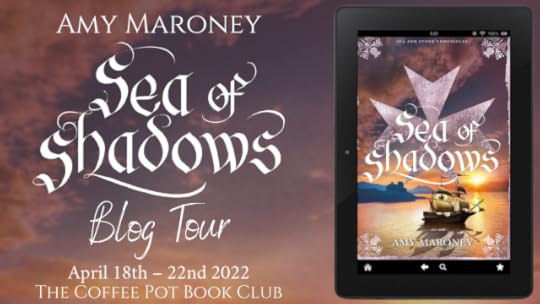
This week, I'm delighted to once again be teaming up with The Coffee Pot Book Club! Today I'm sharing a excerpt from the gorgeous book, Sea of Shadows! This is book two of Sea and Stone Chronicles.
So let's begin by meeting the book...
1459. A gifted woman artist. A ruthless Scottish privateer. And an audacious plan that throws them together—with dangerous consequences.
No one on the Greek island of Rhodes suspects Anica is responsible for her Venetian father’s exquisite portraits, least of all her wealthy fiancé. But her father’s vision is failing, and with every passing day it’s more difficult to conceal the truth.
When their secret is discovered by a powerful knight of the Order of St. John, Anica must act quickly to salvage her father’s honor and her own future. Desperate, she enlists the help of a fierce Scottish privateer named Drummond. Together, they craft a daring plan to restore her father’s sight.
There’s only one problem—she never imagined falling in love with her accomplice.
Before their plan can unfold, a shocking scandal involving the knights puts Anica’s entire family at risk. Her only hope is to turn to Drummond once again, defying her parents, her betrothed, even the Grand Master of the Knights himself. But can she survive the consequences?
With this captivating tale of passion, courage, and loyalty, Amy Maroney brings a lost, dazzling world to vivid life.
Sea of Shadows is Book 2 in a series of stand-alone historical novels packed with adventure and romance.
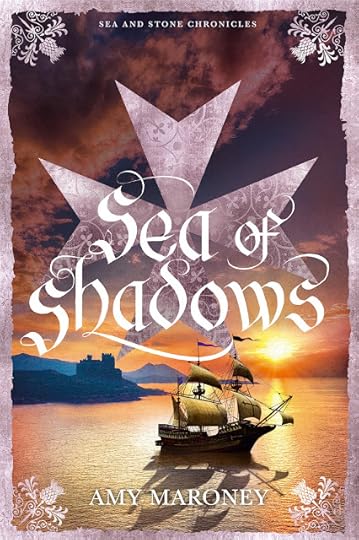
And here's an excerpt to whet your appetite:
Summer, 1459Rhodes Town
When the three dejected knights had disappeared into the corridor, the grand master returned to his seat.
“All went as planned?” he asked Drummond.
“Yes, Lord de Milly. I turned over the Arab merchants we’d held captive, and the Mamluks were satisfied the men had been treated well. My men and I stayed in the Genoese quarter in Alexandria, and no trouble visited us there. The gold you’d been promised was delivered without incident. All around, it was as peaceful a transfer as I could have hoped for.”
One of the Egyptian merchants he’d exchanged for the knights had arranged a deal with the Order. During his captivity in Rhodes Town, the knights had allowed him to live in an elegant home complete with cook and servants. The chest full of gold Drummond had carried back from Alexandria was payment from the merchant’s family for his lavish treatment.
“Do you bring news from the Sultanate?”
Drummond thrust a hand into his leather pouch and fished out the letter. He handed it over with another slight bow.
Lord de Milly turned the letter over in his hands, nodding in satisfaction at the unbroken seal. “Excellent. And I’ve been informed that Signor Syriano has returned to his home as well.”
Drummond nodded. “He was a pleasant companion on the voyage, my lord.”
The grand master’s mouth tightened. “Even though he carries safe-passage papers, I worry each time he journeys east. He’s a valuable asset to the Order. I only let him return to Alexandria and Damascus to get training and supplies that are impossible to obtain here.”
“I’d be happy to accompany him east on his next voyage, Lord de Milly.”
The grand master pulled a small velvet sack from a drawer and tossed it to Drummond. “I wish I had a dozen privateers of your caliber. There are many missions requiring skills that only you seem to have. You’re a seasoned sea captain, your fighting instincts are superb, and you speak—what, a half-dozen languages?” He leaned back in his chair. “I’ve come to expect the highest standards from you, Master Fordun, and I’ve yet to be disappointed. It would be a huge blow to the knights if you were to return to Scotland.”
He put his elbows on the arms of his chair and tented his fingers together, contemplating Drummond with a probing gaze.
“I’ve no intention of returning to my homeland,” Drummond said brusquely.
“Your family must long for your return.”
“My life is here. This is where I belong.” Even as he spoke, the lurch of sorrow in his heart pinned Drummond to the floor like a lead weight. The falcon shifted on its perch, opening its wings and beating the air for an instant. It was as if the bird felt his emotions shift and could not help but react.
“You do have a family, do you not?”
Drummond swallowed. “Of course. My father and mother are dead, God rest their souls. But I’ve brothers and sisters left to me.”
Half his pay went home to them, had always done. If he could, he would take the form of a falcon this instant and wing his way back to Scotland. For his family’s sake, though, he would not return—not as a man, a bird, or a puff of wind. With each letter from a sibling, his heart railed wildly against his ribs, throbbing with hope. So far, the words he’d prayed for had not appeared. It was more than ten years since he left Scotland, and he’d almost given up hoping his chance to go back would come. Hope sometimes hurt more than missing home.
“Do not imagine I take you for granted.” The grand master’s voice softened. “I know exactly how valuable you are to the Order. What can I do to show you our gratitude?”
Drummond looked at him in surprise. This was unexpected. The Order had already been extraordinarily generous to him. Asking for more money when he had a bag of gold in his hand seemed greedy. All he could think to do was stall.
“I—I’d like to reflect on it, my lord, if you find that agreeable.”
“As you wish. At the very least, you must join me for a feast at my villa on Saturday. You’ll be quite entertained, I imagine. And you’ll no doubt make some beneficial acquaintances.”
Drummond weighed the sack in his palm and inwardly groaned. The last thing he wanted was to share a table with fancy folk all spewing hot air. He longed for the freedom to spend his scant time off as he wished. But the grand master was king in all but name. To refuse his invitation would be disastrous. For starters, velvet sacks full of gold coins would never come Drummond’s way again.
“That’s generous of you, my lord,” he replied in as polite a tone as he could muster. “I’d be honored.”
You can buy Sea of Shadows from Amazon UK - Amazon US - Amazon CA - Amazon AU

Now, let's meet the author:
Amy Maroney studied English Literature at Boston University and worked for many years as a writer and editor of nonfiction. She lives in Oregon, U.S.A. with her family. When she’s not diving down research rabbit holes, she enjoys hiking, dancing, traveling, and reading. Amy is the author of The Miramonde Series, an award-winning historical fiction trilogy about a Renaissance-era female artist and the modern-day scholar on her trail. Her new historical suspense/romance series, Sea and Stone Chronicles, is set in medieval Rhodes and Cyprus.
You can find Amy on this links:Website - Twitter - Pinterest - Facebook - Instagram - Amazon - BookBub - Goodreads
To follow the rest of the Sea of Shadows tour, click on the banner below:
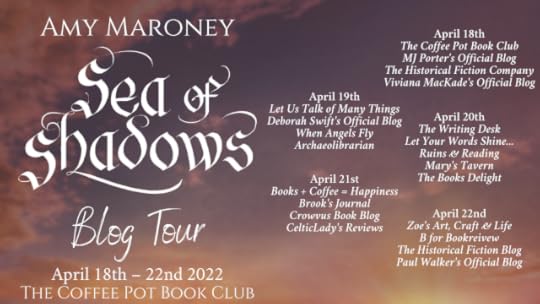
Crowvus Book Blog
- Virginia Crow's profile
- 128 followers


